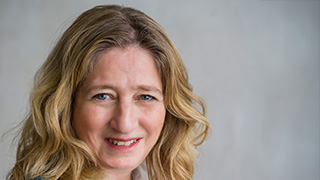The Importance of Being Unwired: Law Professor Gaia Bernstein’s New Book Holds Tech Companies Accountable
Thursday, November 16, 2023

Law School Professor Gaia Bernstein
As the mother of three children who grew up in a world of ever evolving and socially interactive technology, Professor Gaia Bernstein knew there could be problems with online addiction, and a need for moral accountability for the safety of younger generations. What she didn’t foresee when she set out to write her recent book from Cambridge University Press, Unwired: Gaining Control Over Addictive Technologies, was just how significant the legal implications of technology company oversight in creating screen addictions are, and how dangerous the road to reclaiming self-control and focus had become.
Bernstein, who is the Technology, Privacy, and Policy Professor at Seton Hall Law School co-directs the Institute for Privacy Protection and the Gibbons Institute for Law Science and Technology. She is a prolific writer, lecturer, and speaker on legal, health, technology, and privacy issues. A lifelong lover of the law and curious mind, Bernstein has degrees - a LL.M from Harvard, and a J.D. from Boston University, as well as a J.S.D. from New York University. Bernstein attended Tel-Aviv University, earning a B.A. magna cum laude as a double major in psychology and political science.
"Around 2016, the Seton Hall Law School got a big round [of funding] to start an Institute for Privacy Protection; I became the Director, and I decided to do an outreach program to schools," said Bernstein. "The Seton Hall law students went to speak to students at the [middle school] age when they get their first cell phone, and I spoke to parents who spoke to kids about privacy, but also about keeping an online-offline balance." Bernstein’s primary concern, having her own children and seeing how technology was infiltrating their lives, was privacy.
Earlier in the 2010s, she notes, people were not yet as aware of these growing problems as they are today, and broadly, they were not thinking as much about how much time is spent on screens. She realized kids and parents alike were in the same boat. In 2017, after the inception of the Institute for Privacy Protection, she suggested parents advocate "self-help methods" of minimizing technology use for both their children and them, like keeping phones and other screens out of the bedroom, putting them away at dinner, and other common-sense self-regulation practices.
"I really, really thought that once people are more aware, the problem will be solved and I was going to write a book [about this approach], but it was supposed to be…a book about technology addiction, the power of awareness and how we can use legal methods to bring awareness," said Bernstein. She began to suggest that the technology companies should be held accountable for creating these addictions but found no one was talking about the epidemic problems, and there was no proof.
Later, whistleblowers like Tristan Harris, a Co-Founder & President of The Center for Humane Technology and a technology ethicist, appeared in the 2020 documentary The Social Dilemma. Still, Bernstein felt the conversation wasn’t big enough. She began to get louder in her call for technology manufacturers to be accountable for their crimes of intentionally creating digital "fomo," endless page scrolling on social media, and many more subversive and addictive tactics.
"Our society has a technology problem," she wrote in Unwired. Her lectures began to change in tenor and became more focused on collective action and government intervention, she said. Unwired took a new direction. "The book focused much more on…what we can do legally in the society to…exert pressure on technology companies to change the design of their technologies."
These suggestions were initially considered polemical by tech lobbyists and parents who had come to enjoy the peace that comes from kids occupied by screens, and garnered attention from The Washington Post and national morning news shows. Bernstein’s battle cry was, she says ahead of its time.
"After a year [of researching my book], I realized that even though people know so much more about this now, the parents I was lecturing to seemed worse than ever," Bernstein shared. "They seemed more powerless…and they were blaming themselves and their kids, saying "Is my kid an addict?" At this point, she realized that the focus of her work could no longer be on the self-help aspect of changing humans’ technology usage, because, she said, "we can’t help ourselves."
Bernstein feels that while legal measures are vital to creating sanctions on technology company influence, parents need to exert more pressure on schools to actively help children develop balance between screens and real life in their young lives. "There's no reason to just have the kids in front of screens all day, because the studies don't show this is good…actually, the studies show the opposite, that…students don't learn as much from computers and from screens," she said.
Since the pandemic, educators, parents, and legal experts are becoming more focused on encouraging kids and adults to do more living "IRL" ("in real life") and combatting mental illness that screens can worsen - but progress, says Bernstein, has been slow. She suggests we look to the tobacco and food industries for lessons about how government regulation can help stem the tide of digital addiction. Becoming Unwired, Bernstein says, is a movement towards positive change. "We can't put it back in the [Pandora’s] box and you know, I don't think I'm even advocating for that…the goal is to get the addictive elements out of the internet, out of the games. It’s everywhere."
Categories: Law, Research, Science and Technology

